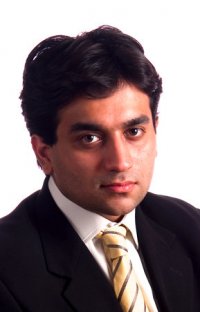From PakStudyLibrary:
 Mir Ibrahim Rahman has joined the distinguished ranks of alumni awarded the Robert F Kennedy Public Service Award from Harvard University, one of the top centres of learning in the world. Mir is the first Muslim and only the second individual from South Asia to have received this Award. Twenty-nine-year old Mir Ibrahim Rahman is the grandson of the late Mir Khalil-ur-Rahman, the founder of the Jang and Geo Groups, the nephew of Group Chairman, Jang Group Mir Javed Rahman, and the son of Group Chief Executive and Editor-in-Chief, Jang and Geo Group Mir Shakil-ur-Rahman.
Mir Ibrahim Rahman has joined the distinguished ranks of alumni awarded the Robert F Kennedy Public Service Award from Harvard University, one of the top centres of learning in the world. Mir is the first Muslim and only the second individual from South Asia to have received this Award. Twenty-nine-year old Mir Ibrahim Rahman is the grandson of the late Mir Khalil-ur-Rahman, the founder of the Jang and Geo Groups, the nephew of Group Chairman, Jang Group Mir Javed Rahman, and the son of Group Chief Executive and Editor-in-Chief, Jang and Geo Group Mir Shakil-ur-Rahman.
Professor of Business Ethics at Babson College James Hoopes, who was Mir Ibrahim’s tutor, said that his former student’s address at the Harvard graduation ceremony was not only an honour but was also one of the best speeches he had heard on the occasion. “He was able to capture the spirit of the current global confusion in a manner that the world needs to hear. In my 40-year career, Ibrahim is the student I feel the proudest about. I believe he possesses a unique combination of practical leadership qualities, intellectual profundity and ideological depth.” He added that his relationship with Mir Ibrahim has now reached a point where “not only do I teach him but I also learn from him. I intend to write a book on leadership in the next few years and if Ibrahim permits me, I would like to mention him in my book so that others too can learn from him.”
Here is the brilliant speech:
So today as I stand here before you… I have some questions my grandfather would have wanted me to ask.
I am not advocating that Iran should have the right to nuclear weapons but I am asking why isn’t there a debate. Why a place like Harvard can hold a debate in the middle of the Forum on Iran, without a proper Iranian point of view presented?
I am not saying that Israel, as well as Islamic dictatorships and illegitimate rulers for that matter, should not be out rightly supported by the US, but I am asking why there is no debate about the measure of that support and the costs of that support to the US and to the World.
At times I feel that due to political correctness/politeness, and not just ideology, America avoid many real political issues.
I am curious why US mainstream media portrays Socialism as a bad word – as bad as communism? I am not saying the US, like all industrialized nations, should provide healthcare to its citizens, but I am asking why the difference between socialism and communism isn’t debated by the media?
I am not saying the US should not spend $3 trillion in the Iraq/Afghanistan wars or that its annual military annual budget should not be more than the entire world combined, but why isn’t there proper national debate about what is the return on investment?
I am not asking the country which has the highest rate of lawsuits per capita, and that believes in its accountability system, why it isn’t suing those responsible for an illegal war against Iraq, leading to millions of deaths, but I am asking why isn’t this issue being debated at least?
I am not saying that ‘Joe the plumber’ should know about every corner of the world better than he does his 1992 world series baseball statistics but I am wondering whose interest it is serving for the average American to be one of the most ill informed world citizens in this age of globalization.
I am not saying that the American political system is no longer the ideal representative system to balance efficiency with fairness, but should you not debate how effective a representative system can be where its average congressman just to get re-elected has to raise between $10,000-30,000… a week! (and where 95% of congressmen are re-elected!)
I am not saying that DC should not have 40,000+ lobbyist spending 4 billion dollars a year, but why isn’t there a debate whether one of the reason you don’t see as much corruption in American politics compared to other country’s is because you have legalized corruption/bribery – aka as lobbying. (some preliminary research shows that up to 70% of discretionary budget is linked to lobbyists!)
Read the full transcript here.
Arbitrary rules, without any real scientific basis, are repeated as gospel by “locavores,” celebrity chefs and mainstream environmental organizations. Words like “sustainability” and “food-miles” are thrown around without any clear understanding of the larger picture of energy and land use.
